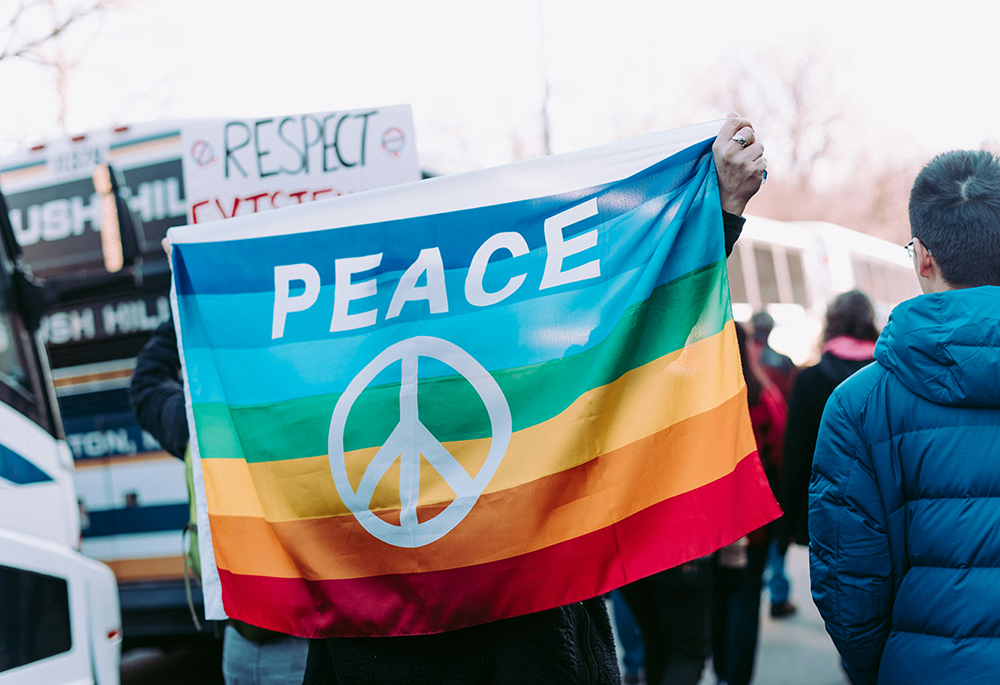

Your Holiness and Your Eminence, the peace of Christ be with you. We write today as a collective of students of Catholic divinity and theological schools and trained ministers. We love this church, we love our Catholic faith, and we ground our ministry in our baptismal call to holiness. We are also trans, nonbinary, and queer and those who love and accompany them. Personally, professionally and ministerially, we are concerned with Dignitas Infinita's statements on gender theory and sex change. We, along with other people of goodwill, write to you today.
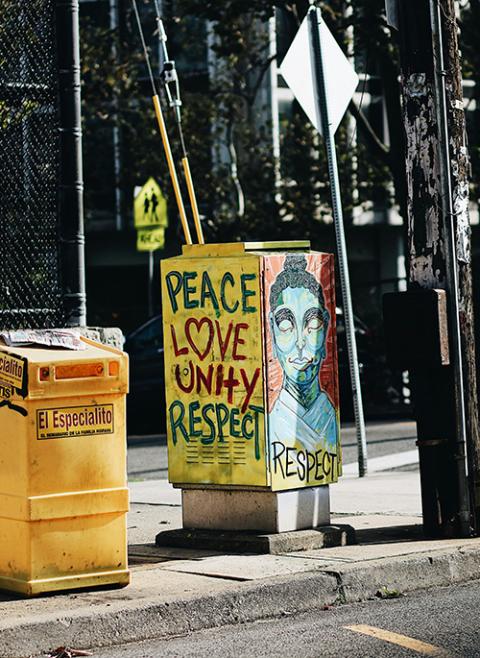
We read with gratitude the document's insistence on inalienable human dignity for migrants, the poor, and others whose dignity is consistently violated. We are saddened, therefore, that the document fails to recognize the dignity of trans and gender-nonconforming people. In its condemnation of gender "ideology" and "sex change," the document marginalizes the infinite dignity in people of all genders and their authentic self-expression and inadvertently perpetuates the harm it aims to overcome.
Ecclesially: Synodality calls us to be open to change and conversion of heart through encounter and listening. This openness makes room for the summons of the Holy Spirit. Dignitas Infinita shows no evidence that its authors were informed by true encounters with trans, nonbinary and intersex people. Instead, the declaration focuses on the threat of "gender theory," painting a diverse academic field as a monolith, a threat, an "ideology," and a phantasm disconnected from actual lives. When we choose a defensive stance such as this one, we close ourselves off from genuine curiosity, life-giving creativity and adequate pastoral responses. Let us be the synodal, listening church that we proclaim ourselves to be.
Theologically: The declaration claims that the goal of "gender theory" is to "deny sexual difference." In recognizing trans and gender-nonconforming individuals, we see no risk of erasing sexual difference. Instead, doing so would affirm the vast sexual difference and dignity of individuals, and the diversity of God's creation. We have seen clearly, in our lives and in our ministries, that trans and gender-nonconforming individuals are not seeking to "make [themselves] God," as Paragraph 57 of the declaration alleges. Rather, continually discerning and living in alignment with one's gender identity can be an affirmation of the unique person whom God created and calls each of us to be.
Ethically: Paragraph 55 of the document states that "it should be denounced as contrary to human dignity the fact that, in some places, not a few people are imprisoned, tortured, and even deprived of the good of life solely because of their sexual orientation." We affirm this statement as we ask: Is the flourishing of trans and gender-nonconforming individuals limited to legal protection from imprisonment, torture and death? Trans and gender-nonconforming Catholics dream that the Catholic Church might someday affirm their dignity not only to survive as who they are, but to live and flourish as who they are.
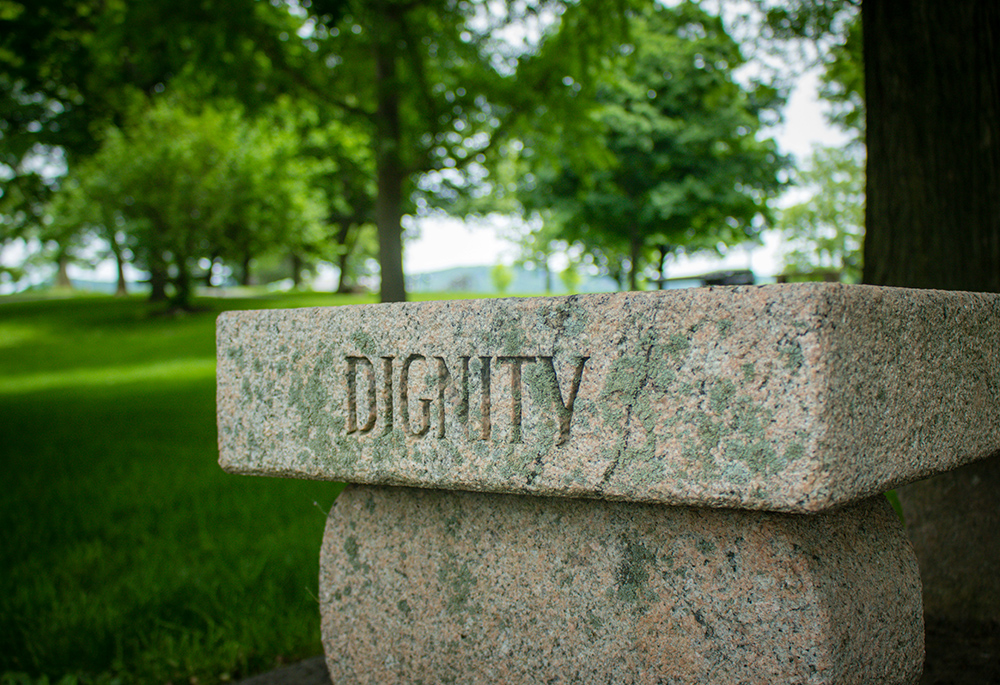
The Catholic ethicists who have formed us write from and with the Catholic tradition, sacred Scripture, the lived experience of suffering peoples, and the insights of academic and scientific disciplines. We admire their commitment to truth and human dignity based on the needs and challenges present in their contexts. We ask that Catholic ethicists who specialize in gender and sexual ethics, particularly LGBTQ+ ethics, be offered the opportunity to participate in the discernment and creation of future documents on gender and sexual diversity using the fullness of their skills. Their training will be invaluable as we, as a church, seek to affirm the dignity of trans, nonconforming and intersex people in accordance with the tradition's insistence on human dignity.
We also call for a commission of queer, trans and intersex theologians, ministers, and lay believers to advise the Dicastery for the Doctrine of the Faith. We implore you to hear the cries of transgender, nonbinary and intersex people. As a church, we cannot love who we do not truly know.
Thank you for your consideration.
Interested parties that would like to add their signature to the open letter can do so here.
Below are comments and stories collected alongside signatures in response to this letter and Dignitas Infinita:
"The day the document came out, I was genuinely worried about going to classes. There was a feeling of fear that I would be targeted, or seen differently. Not from my friends, who I knew supported and cared for me, but from the wider Catholic community in our grad school. I was scared that support and feeling of belonging would be ripped under our feet just because a document denounced our ability to exist and be ourselves. I came out as nonbinary [in the] fall of 2021 and was welcomed by members of my Catholic college community for who I was. From the priests to campus ministers to fellow students, there was always a sense of belonging and acceptance. Going to graduate school, I chose to stay in Catholic education because of the value of formation and because I believed I could still be an authentic trans person in a Catholic space, receive the formation that I needed to do ministry and work next to fellow students and faculty who had similar values and beliefs of justice. The document though has made me question all of that. Would all of that be taken away now that the authority of the church has said no to our existence? This is a question I keep needing to ask now as I enter these spaces, see my friends and colleagues, and wonder . is it all an act now?"
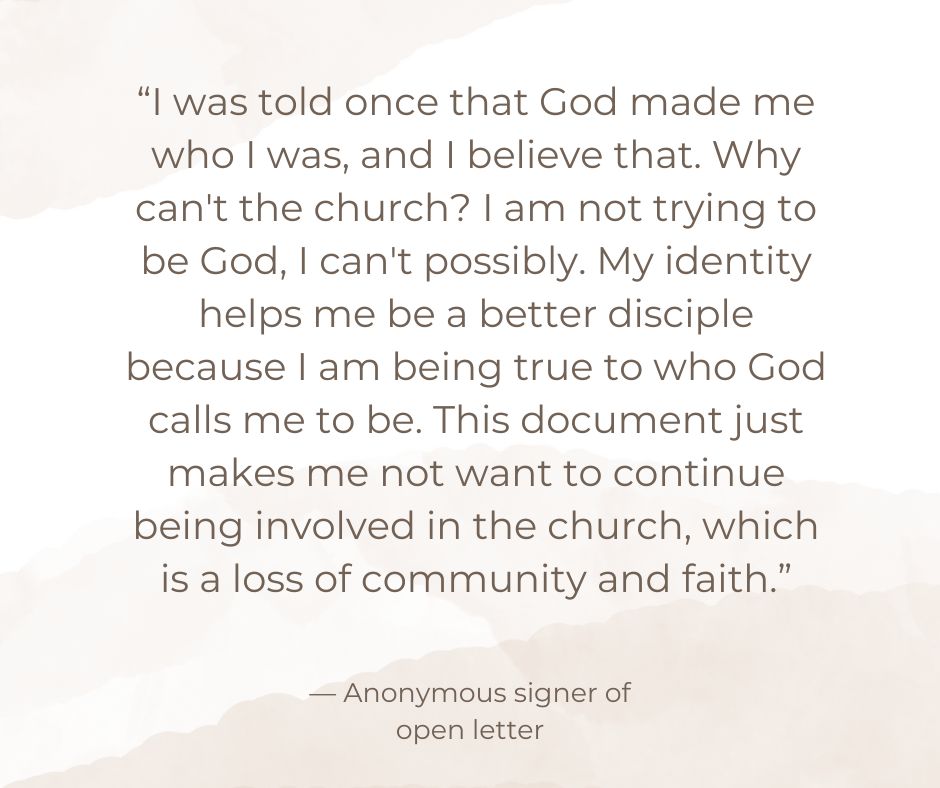
"I was told once that God made me who I was, and I believe that. Why can't the church? I am not trying to be God, I can't possibly. My identity helps me be a better disciple because I am being true to who God calls me to be. This document just makes me not want to continue being involved in the church, which is a loss of community and faith."
"How can we be disciples of Christ if we can't open our eyes to those who are loving and serving God just the same as everyone, and being authentic to ourselves?"
"I have constantly felt like I've had to choose between my vocation and my identity. It's exhausting being a queer minister whose identity must be kept secret to keep myself employed and safe despite my strong calling to theology and ministry and to marriage. These two vocations have been put strongly on my life and I've felt I've had to deny God over and over because of the teachings of the church. I am a queer woman who can love God deeply while also loving other women. How God created me to be is not a contradiction to my dignity, but an affirmation of the beautiful difference and diversity present in the body of Christ. Forcing me and other LGBTQ+ people to choose between their queerness and their calling to Godself dismembers the body of Christ."
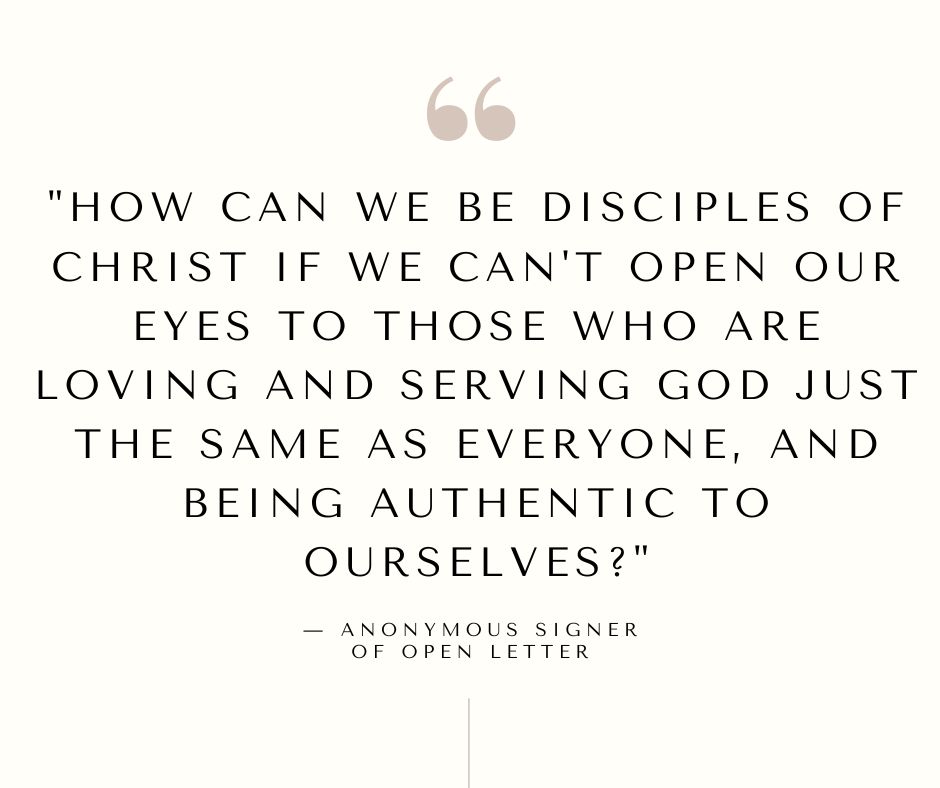
"I am a Catholic man working in lay ministry in an archdiocese in the United States. I lead a young adult group, serve as a lector and eucharistic minister, run eucharistic adoration, and support the children's ministry at my church. I also happen to be transgender and have learned to keep my identity private for safety reasons. I mistakenly made my identity known to a priest in the archdiocese who was leading a trip to World Youth Day. After my participation in the trip was threatened, I had to have multiple conversations with this priest and was ultimately told I could only participate if I had a single room and if I was single and celibate up to and throughout the trip. I was also made to use a separate bathroom when I attended a retreat with the other participants of the trip. After the trip, I found out that part of the reason I was allowed to go is because there was the hope that I would encounter Christ and have a 'conversion' experience. I did encounter Christ through the beauty of the universal church and the loving nature of the Holy Father, which, as it always does, drew me ever closer to the truth that my trans existence was willed, purposeful, meaningful, and part of God's beautiful design for my life. The fact that an influential priest in the archdiocese demonstrated poor understanding of trans experiences and truly fumbled with how to handle my situation brings to light the desperate need for encounter, accompaniment, and learning about people's lived experiences, rather than fearfully hiding behind ideologies."
"I'm a lifelong Catholic and a transgender woman. I've had strong feelings about my gender since age 8, and 60 years later decided to listen to my feelings with intention, leading to my transition from Daniel to Eileen Amy at age 72. I had no idea that it was possible to live with such immense joy in every moment.
My story is this. I was thinking about how to approach the final transition of my earthly life. I asked two Catholic pastors how they would envision my funeral. I knew one of them from their loving ministry to my dying mother-in-law. He listened carefully, then said that I must be recognized in my funeral as the man Daniel, according to my baptismal certificate. The other stated that he wasn't sure, he would need to think more on the issue.
I'll not be among the living upon this earth when this would transpire. But I think of my dearest friends who walked with me on this journey, who found comfort and hope in my joy, and solace in our shared pain. That pastor would really be saying wordlessly to all of them that my authentic self and life-long identity was really just a sham, a dress-up game, a delusion, and a wrong that needs to be erased by the church. I know how I would feel if one of my trans friends was dishonored and humiliated in this way, it makes me almost physically ill, and I wish it on no one."
"We should all be clear: religious (and secular) doctrinal pronouncements get acted out in real life. For me and my trans siblings the unspoken message is that our transness must be erased. Truly, the authors could not even say the word; our identity is literally unspeakable."
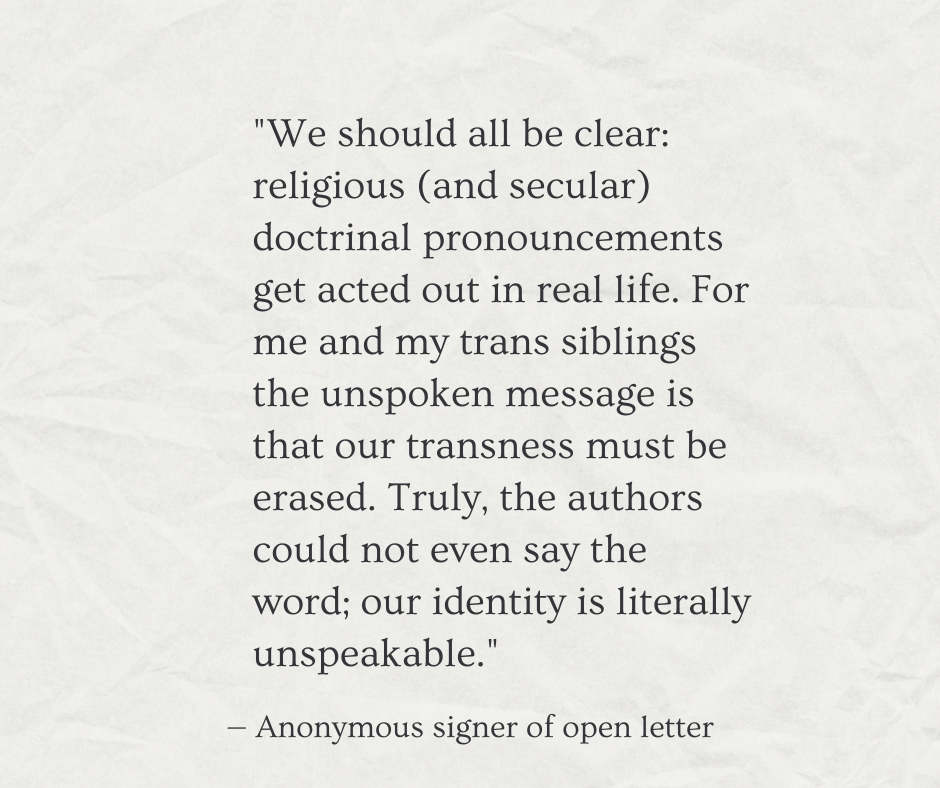
"I was raised Catholic, educated in Catholic spaces, and speak the language of this faith every time I pray. And I pray; I pray for you who are reading this. And I love: I love the rosary; I love the Virgin Mary; I love the Holy Spirit. I love them because they are part of my culture, they are part of my grandparents, they are part of me. They love me, without judgment, as I am a child of God, and as are you. God did not place us on this earth to judge one another, but to love. And I love my trans, nonbinary and intersex siblings for who they courageously continue to become throughout their God-given lives. I pray my words and deeds uplift their human dignity in ways Dignitas Infinita does not. I pray my siblings continue to live as the Lord calls them to live in their divine trans, nonbinary and intersex bodies. May those of us who identify as cisgender see our blessed siblings as God does, clearly and truthfully, and not through clouded, loveless mirrors."
"I have a dear friend who is a trans Catholic woman. She wrote to me that she felt 'completely dehumanized and erased' by this document. There is not a single commentary anywhere here that actually talks about what we know about the transgender experience. It's simply, you were born a boy, and if you imagine you are anything other than our idea of what a boy/man should be in this world, you are in the eyes of the church, just wrong. And we're not going to spend our precious mental energy even thinking about the specifics of your lived experience."
"I co-coordinate a faith sharing community for folks who identify as LGBTQ+, outside of a parish setting, and we have trans and nonbinary members who are very active ministers in their Catholic parishes. They have said that our community is one of the few spaces where they feel they can be safely out, and it is a space where they can grow spiritually from the fullness of who they are, which is so important for our growth in relationship with God. It breaks my heart that they receive the message from our church that their living out of the fullness of their humanity is an affront to human dignity, not only because of all they give to our church community but because they are my beloved siblings. In addition, it seems that we do not take into sufficient account as a church community how these documents and the actions that can result from them directly affect people's lives, not just in terms of what they are able to do or not do, but also their physical safety."
"I grew up feeling like I was going to be damned to hell because of backwards ideologies like this. Jesus said, 'Come as you are' and this is just disgusting behavior. We aren't going to go away because you write it, we exist and we matter."